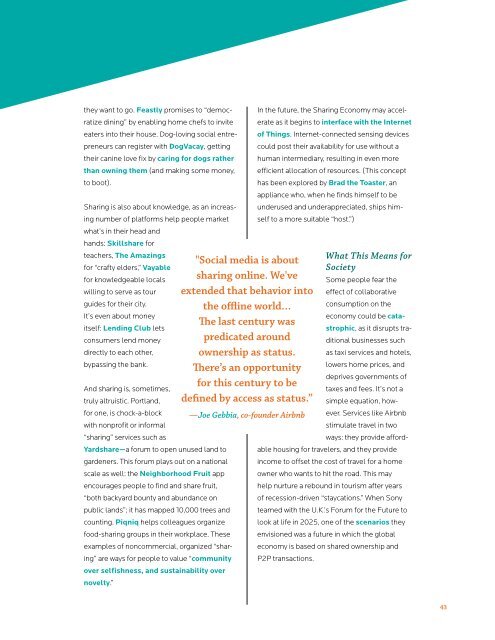1kLPuWX
1kLPuWX
1kLPuWX
You also want an ePaper? Increase the reach of your titles
YUMPU automatically turns print PDFs into web optimized ePapers that Google loves.
they want to go. Feastly promises to “democratize<br />
dining” by enabling home chefs to invite<br />
eaters into their house. Dog-loving social entrepreneurs<br />
can register with DogVacay, getting<br />
their canine love fix by caring for dogs rather<br />
than owning them (and making some money,<br />
to boot).<br />
Sharing is also about knowledge, as an increasing<br />
number of platforms help people market<br />
what’s in their head and<br />
hands: Skillshare for<br />
teachers, The Amazings<br />
for “crafty elders,” Vayable<br />
for knowledgeable locals<br />
willing to serve as tour<br />
guides for their city.<br />
It’s even about money<br />
itself: Lending Club lets<br />
consumers lend money<br />
directly to each other,<br />
bypassing the bank.<br />
"Social media is about<br />
sharing online. We've<br />
extended that behavior into<br />
the offline world…<br />
The last century was<br />
predicated around<br />
ownership as status.<br />
There’s an opportunity<br />
for this century to be<br />
defined by access as status.”<br />
In the future, the Sharing Economy may accelerate<br />
as it begins to interface with the Internet<br />
of Things. Internet-connected sensing devices<br />
could post their availability for use without a<br />
human intermediary, resulting in even more<br />
efficient allocation of resources. (This concept<br />
has been explored by Brad the Toaster, an<br />
appliance who, when he finds himself to be<br />
underused and underappreciated, ships himself<br />
to a more suitable “host.”)<br />
What This Means for<br />
Society<br />
Some people fear the<br />
effect of collaborative<br />
consumption on the<br />
economy could be catastrophic,<br />
as it disrupts traditional<br />
businesses such<br />
as taxi services and hotels,<br />
lowers home prices, and<br />
deprives governments of<br />
And sharing is, sometimes,<br />
truly altruistic. Portland,<br />
for one, is chock-a-block<br />
with nonprofit or informal<br />
“sharing” services such as<br />
—Joe Gebbia, co-founder Airbnb<br />
taxes and fees. It’s not a<br />
simple equation, however.<br />
Services like Airbnb<br />
stimulate travel in two<br />
ways: they provide affordable<br />
Yardshare—a forum to open unused land to<br />
gardeners. This forum plays out on a national<br />
scale as well: the Neighborhood Fruit app<br />
encourages people to find and share fruit,<br />
“both backyard bounty and abundance on<br />
public lands”; it has mapped 10,000 trees and<br />
counting. Piqniq helps colleagues organize<br />
food-sharing groups in their workplace. These<br />
examples of noncommercial, organized “sharing”<br />
are ways for people to value “community<br />
housing for travelers, and they provide<br />
income to offset the cost of travel for a home<br />
owner who wants to hit the road. This may<br />
help nurture a rebound in tourism after years<br />
of recession-driven “staycations.” When Sony<br />
teamed with the U.K.’s Forum for the Future to<br />
look at life in 2025, one of the scenarios they<br />
envisioned was a future in which the global<br />
economy is based on shared ownership and<br />
P2P transactions.<br />
over selfishness, and sustainability over<br />
novelty.”<br />
43


